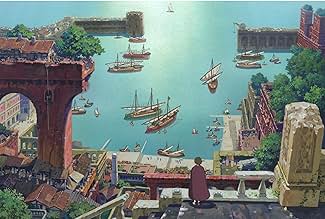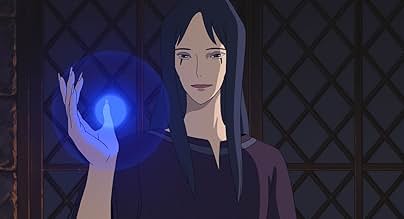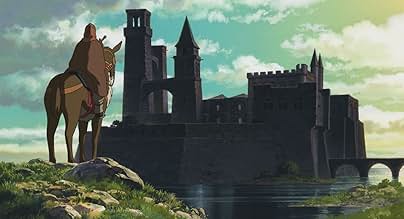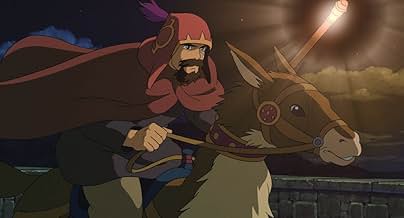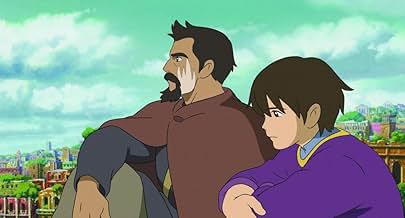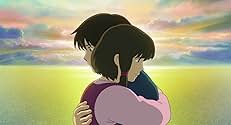IMDb RATING
6.3/10
47K
YOUR RATING
In a mythical land, a man and a young boy investigate a series of unusual occurrences.In a mythical land, a man and a young boy investigate a series of unusual occurrences.In a mythical land, a man and a young boy investigate a series of unusual occurrences.
- Awards
- 3 nominations total
Timothy Dalton
- Sparrowhawk
- (English version)
- (voice)
Willem Dafoe
- Cob
- (English version)
- (voice)
Mariska Hargitay
- Tenar
- (English version)
- (voice)
Jun'ichi Okada
- Arren
- (voice)
Aoi Teshima
- Theru
- (voice)
Bunta Sugawara
- Haitaka
- (voice)
Yûko Tanaka
- Cob
- (voice)
Teruyuki Kagawa
- Hare
- (voice)
Jun Fubuki
- Tenar
- (voice)
Takashi Naitô
- Hazia Dealer
- (voice)
Mitsuko Baishô
- The Mistress
- (voice)
Yui Natsukawa
- The Queen
- (voice)
Kaoru Kobayashi
- The King
- (voice)
Matt Levin
- Arren
- (English version)
- (voice)
Cheech Marin
- Hare
- (English version)
- (voice)
Blaire Restaneo
- Therru
- (English version)
- (voice)
Jeff Bennett
- Additional Voices
- (English version)
- (voice)
Susanne Blakeslee
- The Queen
- (English version)
- (voice)
- (as Suzanne Blakeslee)
Featured reviews
I like both Studio Ghibli films and Ursula LeGuin's 'Earthsea' books, but this film did little for me. While the backgrounds and 'set pieces' were striking, as expected in anime from this studio, the realisation of the characters left a lot to be desired, especially Ged who was bland and Cob, who was oddly androgynous. I also found the voices used in the English version either dull (Timothy Dalton's generic 'gentle English lord') or silly (Cheech Marin's hodgepodge of accents). The biggest weakness, however, was the story, which was just boring - by the time things began to happen, I'd stopped caring and was just waiting for the film to end. Pity: LeGuin's 'Earthsea' series could make a fantasy epic to rival the 'Lord of the Rings' trilogy or the 'Harry Potter' series, but so far, all we have is a second-rate anime and an awful made-for-TV 'sword and sorcery' romp.
Films experiencing production hell are rarely as good as they might have been, no matter how good the director is (c.f. Gangs of New York and AI) and this one is no exception.
Taken on its own terms, Tales of Earthsea is a competent, if not breathtaking, start for Miyazaki junior, and bears comparison to the lesser Gibli canon without scaling the heights of its major work. It is unfair to compare it to My Cousin Totoro, Spirited Away or Graveyard of the Fireflies; but it is also a shame for the fans of Earthsea. They didn't get a top director at the top of his game.
The principal problem with the film is that it doesn't seem to know what to do with the books it is based on. Are they source material to be pillaged? Are they stories to be adapted? Are they concepts to be explored? In the end Miyazaki opts for a mix: the narrative structure is broadly based on the third novel (The Farthest Shore), with a significant sub-plots from both the first (The Wizard of Earthsea) and the fourth (Tehanu). Into the mix he throws some recognisable manga/anime formulae (the arch-enemy; the ronin henchmen; the violence) which cut across the major themes explored by the novels and alluded to by the film.
If this all sounds like a disaster, it isn't exactly. The plot functions: evil wizard, through pride, upsets the balance of Earthsea forcing archmage, Sparrowhawk, in the company of a young prince, to do battle to restore the balance, destroy the evil and face down their own demons. Had Miyazaki been more ruthless all would probably have been well for anime fans anyway. But there are too many blind alleys, lose ends and needless distractions all nods to the books - which make the first half of the film in particular feel like a second rate brass band meandering painfully around a Brassed Off version of Adagio for Strings. The narcotic Hazia, for example, which dominates the beginning of the third story, is introduced early in the film and then simply abandoned. Later, Tenar's back-story fades into nothingness leaving the audience with a forcible impression of a producer impatiently looking at his watch. The whole effect is not homage, but distraction and a film that it is at least 40minutes longer than it needed to be.
Ursula LeGuin, who wrote the Earthsea novels, had suggested to (Hayao) Miyazaki that he create new story for Ged, uncluttered by her previous stories, set in the many years between the first two books. This would have made for a less ponderous film.
Regarding the technical side of animation; it appears the younger Miyazaki was aiming for the dreamlike quality of animation so characteristic of his father's work. Again, he has some partial success in this regard, although it is undeniably more clunky than other Gibli titles. But a lot can be forgiven for his reliance on hand-drawn animation, and there are some moments of real beauty windblown grasses, rocks on the seashore and chill sunsets. This, along with some strong characters and a much tighter second half, make Tales from Earthsea watchable film, if a slightly underwhelming one. But better than Disney. 6/10
Taken on its own terms, Tales of Earthsea is a competent, if not breathtaking, start for Miyazaki junior, and bears comparison to the lesser Gibli canon without scaling the heights of its major work. It is unfair to compare it to My Cousin Totoro, Spirited Away or Graveyard of the Fireflies; but it is also a shame for the fans of Earthsea. They didn't get a top director at the top of his game.
The principal problem with the film is that it doesn't seem to know what to do with the books it is based on. Are they source material to be pillaged? Are they stories to be adapted? Are they concepts to be explored? In the end Miyazaki opts for a mix: the narrative structure is broadly based on the third novel (The Farthest Shore), with a significant sub-plots from both the first (The Wizard of Earthsea) and the fourth (Tehanu). Into the mix he throws some recognisable manga/anime formulae (the arch-enemy; the ronin henchmen; the violence) which cut across the major themes explored by the novels and alluded to by the film.
If this all sounds like a disaster, it isn't exactly. The plot functions: evil wizard, through pride, upsets the balance of Earthsea forcing archmage, Sparrowhawk, in the company of a young prince, to do battle to restore the balance, destroy the evil and face down their own demons. Had Miyazaki been more ruthless all would probably have been well for anime fans anyway. But there are too many blind alleys, lose ends and needless distractions all nods to the books - which make the first half of the film in particular feel like a second rate brass band meandering painfully around a Brassed Off version of Adagio for Strings. The narcotic Hazia, for example, which dominates the beginning of the third story, is introduced early in the film and then simply abandoned. Later, Tenar's back-story fades into nothingness leaving the audience with a forcible impression of a producer impatiently looking at his watch. The whole effect is not homage, but distraction and a film that it is at least 40minutes longer than it needed to be.
Ursula LeGuin, who wrote the Earthsea novels, had suggested to (Hayao) Miyazaki that he create new story for Ged, uncluttered by her previous stories, set in the many years between the first two books. This would have made for a less ponderous film.
Regarding the technical side of animation; it appears the younger Miyazaki was aiming for the dreamlike quality of animation so characteristic of his father's work. Again, he has some partial success in this regard, although it is undeniably more clunky than other Gibli titles. But a lot can be forgiven for his reliance on hand-drawn animation, and there are some moments of real beauty windblown grasses, rocks on the seashore and chill sunsets. This, along with some strong characters and a much tighter second half, make Tales from Earthsea watchable film, if a slightly underwhelming one. But better than Disney. 6/10
I am a huge fan of both Ursula Le Guin and Studio Ghibli but the story and the presentation just weren't all they needed to be. The fragments of story they excerpted from the novel lacked cohesiveness, so the characters' stories were truncated and lost. The art work was true to the beauty of Ghibli. I'm disappointed that I can only give this film a 6 (fair) out of 10. {Animated Fantasy}
I am a great fan of the LeGuin books, and when I learned that Studio Ghibli was going to be involved in making of the film I eagerly looked forward to its release. I hoped it would make up for the awful SciFi Channel-aired film. The good news in this outing is, there is genuine respect for the source material, even if it is not done genuine honor.
The plot of the film is an amalgamation of elements of several of the Earthsea books, creating a new villain and having characters interact that indeed barely met in the books. While I could not help but feel disappointed by these changes, the film is still visually enjoyable to behold. It does not compare as favorably to Howl's Moving Castle, a story drastically altered from its own source material that still manages to stand on its own as a story.
I could not help but think, as I watched the character Arren develop, why? Why, when there is such wonderful source material, that his introduction came across so muddled and poorly reasoned. I viewed the film with someone who had never read the books, and she really enjoyed it. Despite the film's shortcomings, you generally care for the cast by the end.
The plot of the film is an amalgamation of elements of several of the Earthsea books, creating a new villain and having characters interact that indeed barely met in the books. While I could not help but feel disappointed by these changes, the film is still visually enjoyable to behold. It does not compare as favorably to Howl's Moving Castle, a story drastically altered from its own source material that still manages to stand on its own as a story.
I could not help but think, as I watched the character Arren develop, why? Why, when there is such wonderful source material, that his introduction came across so muddled and poorly reasoned. I viewed the film with someone who had never read the books, and she really enjoyed it. Despite the film's shortcomings, you generally care for the cast by the end.
Eh, let's just call Tales from Earthsea a case of growing pains for Goro Miyazaki.
It's not a bad movie. It's just unremarkable in every way. It doesn't have the creativity, emotional depth, or beauty of Spirited Away, the visual wonder of Howl's Moving Castle, the scope of adventure of Castle in the Sky, the lovable characters of Kiki's Delivery Service, or the sheer delight and fun of Ponyo.
If I had to choose a defining feature for Earthsea, I honestly don't know what it would be. The music is fine, but nothing extraordinary. The character designs and artwork are dangerously close to generic, the story lacks tension and feels almost inconsequential, and the writing is bland. Where's the heart? Where's the humor, the passion, or something that would draw me into the narrative?
I found myself not caring much about what was happening, and more concerned with how much time was left until the movie was over, than anything else. My expectations for Studio Ghibli are far too high to embrace a movie like this that barely scrapes above mediocrity, and from what I've heard from fans of the Earthsea literature, this isn't the adaptation they were hoping for, either.
It's not a bad movie. It's just unremarkable in every way. It doesn't have the creativity, emotional depth, or beauty of Spirited Away, the visual wonder of Howl's Moving Castle, the scope of adventure of Castle in the Sky, the lovable characters of Kiki's Delivery Service, or the sheer delight and fun of Ponyo.
If I had to choose a defining feature for Earthsea, I honestly don't know what it would be. The music is fine, but nothing extraordinary. The character designs and artwork are dangerously close to generic, the story lacks tension and feels almost inconsequential, and the writing is bland. Where's the heart? Where's the humor, the passion, or something that would draw me into the narrative?
I found myself not caring much about what was happening, and more concerned with how much time was left until the movie was over, than anything else. My expectations for Studio Ghibli are far too high to embrace a movie like this that barely scrapes above mediocrity, and from what I've heard from fans of the Earthsea literature, this isn't the adaptation they were hoping for, either.
Did you know
- TriviaHayao Miyazaki first wrote to author Ursula K. Le Guin about adapting her book into a film. LeGuin at the time was unfamiliar with Miyazaki's work, and associated animation to be similar to Disney animation, and turned the offer down. After she saw Mon voisin Totoro (1988), she loved it, and decided to allow the movie to be made.
- Quotes
Haitaka: Now listen to me, Aaren: No man nor any living thing in this world preserves their life forever. But only to men is it given to know that we must die, and that is a precious gift. This life that is both our torment and our treasure was never meant to endure for eternity. Life is a wave on the sea. Would you force the sea to grow still to save one wave? To save yourself?
- ConnectionsFeatured in New York, I Love You (2008)
- SoundtracksSong of Time
Lyrics by Akino Arai and Gorô Miyazaki and music by Akino Arai and Hisaaki Hogari
Performed by Aoi Teshima
Details
- Release date
- Country of origin
- Official site
- Language
- Also known as
- Cuentos de Terramar
- Production companies
- See more company credits at IMDbPro
Box office
- Gross US & Canada
- $48,658
- Opening weekend US & Canada
- $20,614
- Aug 15, 2010
- Gross worldwide
- $68,727,579
- Runtime
- 1h 55m(115 min)
- Color
- Sound mix
- Aspect ratio
- 1.85 : 1
Contribute to this page
Suggest an edit or add missing content




